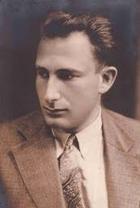
Although the name Josef Bor does not appear in many Czech lexicons of twentieth-century Czech literature, his contribution to literature of the Holocaust is significant and certainly worthy of mention. He was born Josef Bondy in Ostrava in 1906 and spent his working life as a lawyer. He and his family were transported to Terezín and later to Buchenwald, where his wife and two children were killed. He returned alone to Prague, where he became foreign minister and worked in the Czech government under Ladislav Svoboda. He remarried and had two children with his second wife. It was not until he was more than 50 years old that he began to write. Bor's work can be contrasted with that of F.E. Kraus; however, Bor attempts to dig psychologically deeper and does not point accusatory fingers in his works but rather tries to show the value of a person's being in the face of deadly danger (Literatura s hvězdou Davidovou ). In O městu ve tvaru hvězdy M. Valtrová describes Bor as "belonging to those authors whose work whips unexpectedly like a flame." His first work, Opuštěná panenka ("The Derelict Doll," 1961), has an autobiographical subtext and presents the fate of three generations of an extended Jewish family interned in Terezín and later in the death camps. The doll is symbolic for the suffering and loss of human dignity in the camps. In Věstník: Židovskích náboženskích obcí v Československu it is stated that in this work, "We see the ghetto from two sides: on one side there is suffering, which the superman has wrought for his victim; on the other, there is cultural life, brotherhood, and resistance."It was at the urging of friends that Bor penned Terezínské rekviem (The Terezín Requiem ), and this work belongs among the best of Holocaust remembrance. The study of Giuseppe Verdi's Requiem was a great joke for Adolf Eichmann, who laughed when he heard that Jews would be singing a Catholic opera. The musical and ideological version of the requiem, however, was reworked by Director Raphael Schächter, who made the words "Libera me!" ("Set me free!") the key phrase that escaped the comprehension of the Nazis in the audience.




